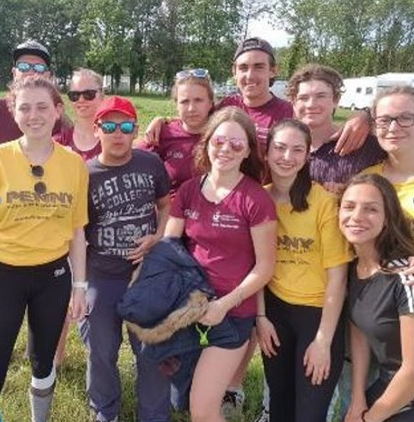We can support you to welcome a young volunteer to your organisation

Getting into volunteering at a young age can lead to a lifelong interest in engaging with the community, so welcoming a young person to your organisation could have a really positive impact.
In return, the benefits for your organisation can be huge - young people are a great resource and can bring energy and new ideas. If you don't already work with young volunteers you may need to do some preparation, so here's some useful information to get you started.
Think about what the volunteer might be able to do. While tasks should be simple, young people get bored easily. Most relish the opportunity to be change-makers. Maybe they could redesign a system or carry out a survey for you? With a little bit of training and support, the sky’s the limit.
Most young people would prefer to volunteer alongside a friend. If you can welcome more than one volunteer, you may get more interest.
Our handy CHECKLIST includes all the policies and procedures you will need in place. We know you’re very busy and some of this may seem complicated so do get in touch if you need some support.
Recruiting through the Duke of Edinburgh Award programme
Many organisations recruit young volunteers through the Duke of Edinburgh (DofE) programme. There are three Award levels in the programme; Bronze - for those in Year 9 or above (aged over 13 years), Silver - for those in Year 10 or above, and Gold - for those aged over 16 years.
Activities for each DofE section take a minimum of one hour a week over a set period. All awards have 4 sections.
- Volunteering
- Physical
- Skills
- Expedition
For the Bronze Award, two sections should be undertaken for 3 months and 1 section for 6 months; Silver Award - two sections for 6 months and one for 3 months (unless direct entrant when one section for 12 months); Gold Award – two sections for 12 months and one for 6 months (unless direct entrant then one section for 18 months). More details about the award can be found here.
The organisation supporting the young person (such as their school, Scouts group or college) and the young person themselves should ensure the volunteer placement meets the criteria of the scheme before they start volunteering. Key criteria include being in a charity or not for profit organisation. You can choose to be a DofE Authorised Activities Provider (AAP) through a licensing system, and this allows you to advertise on their website. This incurs a small one-off annual cost however, you do not need to do this to provide volunteering opportunities. More details here.
You can also advertise your role on our volunteering website, Spark a Change where we have a dedicated page of Duke of Edinburgh opportunities.
The main thing you will be asked to do at the end of a volunteer experience is write a brief Assessor’s Report. DofE ask that these are specific to the young person, give some details of what the young person has done, and includes start and finish dates. You can do this in the young person’s DofE book or online. More information is available Here.
If you have any questions about the DofE award in Somerset, please contact the DofE Team directly on DofE@somerset.gov.uk.
Insurance
Volunteers aged under 18 (especially those under 16) may not automatically be covered by your insurance. You will need to double check whether this is case.
DBS Checks
In some, but not all, situations it will be necessary for adults working with young volunteers to have DBS checks. For more information, this COMPREHENSIVE GUIDE is helpful. Or contact Spark Somerset's DBS Officer, Leonie Cole at DBS@SPARKSOMERSET.ORG.UK. We are a Registered Body with the DBS and can carry out checks on your behalf - We have many years’ experience and can take away the hassle for you with our friendly 1:1 service. Find out more HERE.
Policies and Procedures
You probably already have a shelf full of policies and procedures, but it's a good idea to make sure that staff or volunteers supervising young volunteers are familiar with the following:
- Safeguarding/Child Protection
- Health and Safety
- Equality and Diversity
Risk Assessments
A young volunteer probably won’t have experience of the tasks involved in volunteering for you and may not be used to assessing risk for themselves. To keep them and other volunteers safe, it may be necessary to carry out a risk assessment. If a significant risk of harm remains after you have taken reasonable steps to avoid it, the young person shouldn’t carry out the activity in question. Parents should be made aware of the risk assessment.
More detailed guidance is available HERE
Communicating with parents
If a volunteer is under 16 years old, you should get parental consent for them to volunteer (sample form available HERE). It can be harder to get consent for 16-18 year olds, but you should encourage them to tell their parents what they’re doing and when. Parents may also like to see a written role description and some information about what your organisation does. If the volunteer will be working away from the place where they usually volunteer, it is worth seeking additional permission.
Make sure you have emergency contact details. These can also come in handy if a young volunteer fails to turn up when expected.
When using photos of young volunteers for publicity purposes you need to obtain their permission and, if they are under 16, the permission of their parent or guardian to use them.
If a young person is living independently of parents or social services, they may provide their own consent.
Data Protection
Young people have the same rights as adults over their personal data. However, those under thirteen will need parental consent for holding and using their personal information. We advise that both young person and parent/guardian sign a volunteering agreement that includes a statement about personal data.
Privacy notices should be clear and written in plain English.
If you need further help with data protection, please GET IN TOUCH.
Expenses
If young people are relying on public transport to reach a volunteering opportunity, it can be very expensive for them. If your organisation can afford to do so, it is worth considering reimbursing young volunteers for travel costs. Make sure that a record is kept of any money that you give to them.
Somerset County Council Work Permits
Somerset County Council has introduced a new work permit for under 16's coming into your organisation, on a voluntary or paid for basis in some circumstances. But don't panic! This is only in very specific circumstances- please don’t be put off involving young people in your organisation. Here is the guidance that we have received from Somerset County Council:
A young person volunteering for a charity does not need a work permit, unless the volunteering includes fundraising activity (such as working in a charity shop). It may be easier to consider if the volunteering is for direct service provision (no permit needed) or the charity’s financial gain (work permit needed).
If a young person who is volunteering does not need a work permit, a risk assessment should be carried out, covering the safeguarding of young people that are volunteering.
Any volunteering must adhere to the laws that govern employment of children, if the volunteering meets the description of employment as described above (i.e. for a for-profit organisation or charity’s financial gain).
This advice is derived from the Somerset County Council bylaws.
Applying for a work permit only takes a few minutes and can be done HERE.
If you have any questions, please contact the Somerset Education Safeguarding Team at CHILDRENS@SOMERSET.GOV.UK.
Induction
When your young volunteer starts, bear in mind that they may not have any experience of the workplace and may not feel confident enough to ask questions. Your induction could include:
- What the organisation does plus practical information, such as:
- Where are the toilets?
- What time do I need to be here?
- What happens if I have an accident?
- Where do I make a drink?
- Who do I contact if I can’t come in?
As well as their supervisor, your volunteer will need to meet other people in the organisation and find out what they do. Think about who your volunteer will come in to contact with whilst they are volunteering and make introductions as appropriate.
Make them aware of your expectations around behaviour and conduct, including confidentiality where appropriate, and discuss the use of phones and social media.
It's a good idea for young volunteers to be given a small volunteer information pack but bear in mind that paper often gets lost. Encourage them to put any important names and contact numbers straight into their mobile phone.
Supporting your volunteer in their role
Make sure that you plan regular catch ups to check on how the young person is getting on. They may not feel confident enough to ask for help and voice concerns while they are actually volunteering.
You can also use these chats to encourage volunteers to think about the skills that they are developing and how they might record them on their CV. A young person may not see this as valuable at the time, but they will when it comes to applying for jobs and further education!
Exit strategy
Sadly, it’s unlikely that your young volunteer will stay forever. Make it easy for them to leave as they progress on to other things. If possible, plan for them leaving and take time to thank them for their contributions, and offer to act as a referee.
Please get in touch if you’re not sure about anything
Email volunteer@sparksomerset.org.uk or contact us via Live Chat.

